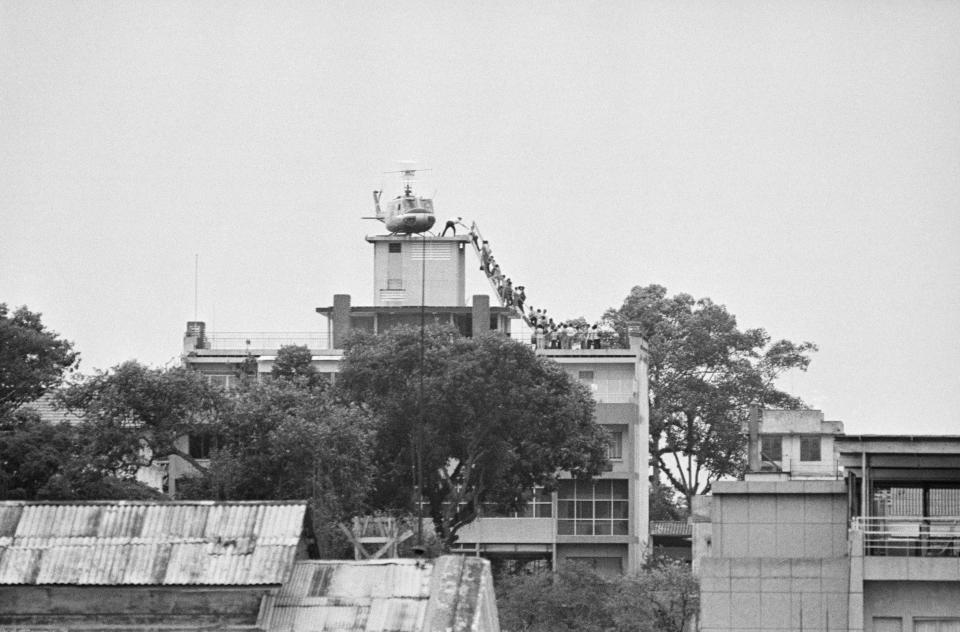Pulling out of Afghanistan could lead to 'another Saigon,' counterterrorism expert warns
A draft U.S. peace deal with the Taliban could result in “another Saigon” in which the Afghan government is toppled from power and its leaders executed after U.S. troops withdraw, warns a former top FBI counterterrorism agent and international security consultant.
“If we continue the negotiations only between us and between the Taliban, that is not a withdrawal — that is another Saigon,” said Ali Soufan, one of the FBI’s lead agents targeting al-Qaida before the 2001 terror attack, when the group was headquartered in Afghanistan under the protection of the Taliban. “Because, you know, we’re telling the Afghan government, we’re telling the Afghani security forces, we’re telling the Afghani army, ‘We’re out of here.’”
In April 1975, as Saigon (now Ho Chi Minh City) fell to North Vietnamese troops, U.S. personnel in the South Vietnamese capital organized a chaotic evacuation by helicopter. South Vietnamese government officials were taken captive, imprisoned, exiled or executed.
Soufan’s comments in an interview for Yahoo News’ “Skullduggery” podcast came just hours before the Taliban claimed responsibility for a suicide car bombing in Kabul on Thursday morning that killed a U.S. service member.
It was the Taliban’s second terror attack in the Afghan capital in the last three days, the latest sign that the group seems determined to continue its insurgency despite the announcement by lead U.S. negotiator Zalmay Khalilzad on Sunday that he had reached an agreement “in principle” with the Taliban to begin U.S. troop withdrawals. The U.S. has been fighting in Afghanistan since shortly after the 9/11 attacks, first to oust the Taliban, and subsequently to support the new government and keep the Taliban from returning to power. There are around 14,000 U.S. troops there, and more than 2,200 Americans have been killed there since the conflict began — including three in the last week.
It is a deal, still pending President Trump’s approval, that was reached in the latest round of talks in Doha, Qatar, from which the Afghan government has been excluded.
Download or subscribe on iTunes: “Skullduggery” from Yahoo News
Soufan said the Taliban’s refusal to negotiate with Afghan officials — or participate in planned elections — was a sign that the group feels emboldened and has no intention of abandoning its bid to regain control of the country and restore its version of Sharia, or strict Islamic law.
“Remember what happened to Najibullah when the Taliban took Kabul and how they hung him from a lamppost?” said Soufan, referring to the Soviet-allied president of Afghanistan, Mohammad Najibullah, who was executed after the Taliban initially seized control of the capital in 1996.
Such scenes could be repeated given the Taliban’s renewed strength in the country, he told Yahoo News.
“They control more provinces in Afghanistan than anytime since 2001. They are in a position of power today,” Soufan said. “So now how are we going to bring the Afghani government to the table? How are we going to convince the Taliban to negotiate with the Afghani government? How are we going to convince the Taliban to participate in an election, right? Because if they don’t want an election, that means they want a hostile takeover of the government, and that’s exactly what’s going to happen if they don’t agree on a lot of these things.”

Soufan’s comments echo the concerns of many national security experts and some U.S. officials, including White House national security adviser John Bolton, who has been sidelined from the U.S.-Taliban talks and was reportedly even denied a request for a copy of the draft peace deal by Khalilzad.
Soufan emphasized that, as much as anybody, he would like to see U.S. troops withdrawn from Afghanistan after 18 years of fighting. But he added that a hasty withdrawal, without the participation of the Afghan government, the various ethnic groups in Afghanistan and foreign countries with influence there, including Pakistan, China and Russia, is a prescription for failure.
“I feel we will just be betraying the people who put all their eggs in our basket,” he said. “If we pull out by surrendering our power to the Taliban, that is going to weaken American influence in the region for decades to come.”
_____
Download the Yahoo News app to customize your experience.
Read more from Yahoo News:



